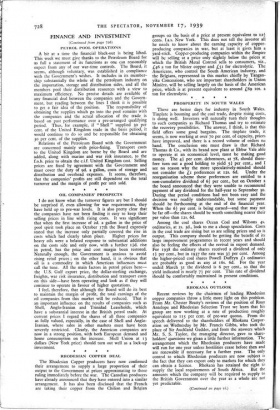OIL COMPANIES' PROSPECTS
I do not know what the turnover figures are but I should be surprised if, even allowing for war requirements, they have held up to pre-war levels. It is also pretty clear that the companies have not been finding it easy to keep their selling prices in line with rising costs. It was significant that when the first increase of 2d. a gallon in the price of pool spirit took place on October 17th the Board expressly stated that the increase only partially covered the rise in costs which had clearly taken place. Higher prices for heavy oils were a belated response to substantial additions on the costs side and only now, with a further ild. rise in petrol, has the price and cost margin been restored. Naturally enough, the Government is anxious to avoid rising retail prices ; on the other hand, it is obvious that oil is a commodity in which American influences must call the tune. All the main factors in petrol prices here— the U.S. Gulf export price, the dollar-sterling exchange, freights, war risk insurance, distribution and transport costs on this side—have been operating and look as if they will continue to operate in favour of higher quotations.
I feel, therefore, that although the Board will do its best to maintain the margin of profit, the total earnings of the oil companies from this market will be reduced. That is an important influence on the results of companies such as Shell, Anglo-Iranian and Trinidad Leaseholds, which have a substantial interest in the British petrol trade. At current prices I regard the shares of all three companies as fully valued, especially, in the case of Shell and Anglo- Iranian, where sales in other markets must have been severely restricted. Clearly, the American companies are now in a strong position, with both European demand and home consumption on the increase. Shell Union at 13 dollars (New York price) should turn out well as a lock-up investment.




































































 Previous page
Previous page